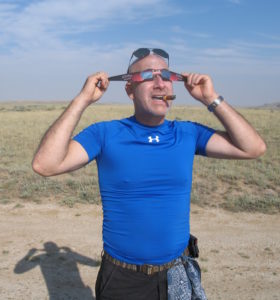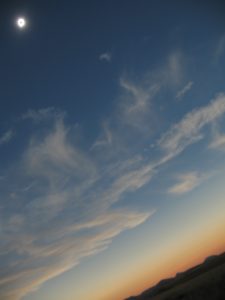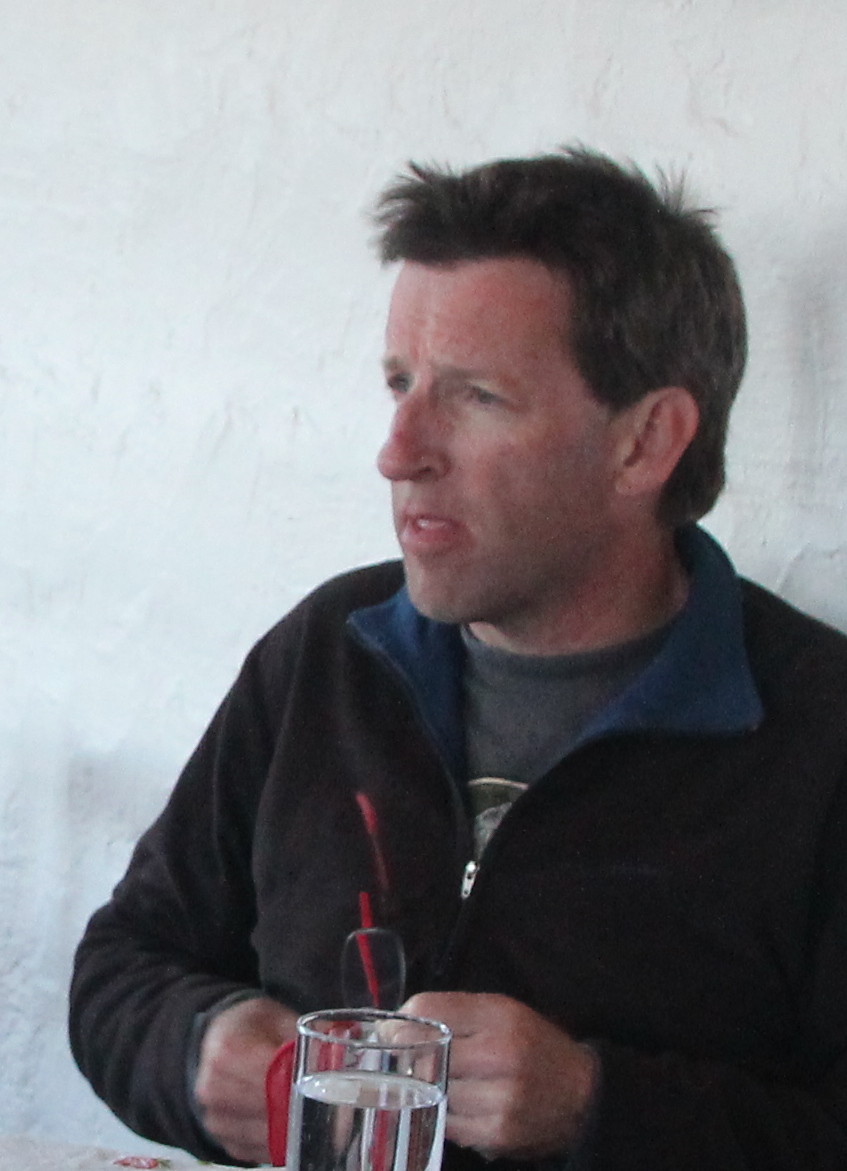 The day before the eclipse, the Middle Fork Cafe in Lander, Wyo., was bustling at lunchtime, the usual crowd of Sunday locals and Yellowstone-bound tourists vastly swelled by twosomes and families of eclipse chasers. They were on their way somewhere else: Lander was right on the edge of totality. If you’d already traveled hours or days to get there, there was no reason not to proceed closer to the center, where the total eclipse would last longer.
The day before the eclipse, the Middle Fork Cafe in Lander, Wyo., was bustling at lunchtime, the usual crowd of Sunday locals and Yellowstone-bound tourists vastly swelled by twosomes and families of eclipse chasers. They were on their way somewhere else: Lander was right on the edge of totality. If you’d already traveled hours or days to get there, there was no reason not to proceed closer to the center, where the total eclipse would last longer.
The young waitresses were working hard, hustling back and forth with omelets, sandwiches, Bloody Marys. “We’re going to get through it,” said our server, gamely.
Where was she going to watch the eclipse?
“You have to understand, Wyoming is a state full of introverts,” she said. “I’m going to watch it from my roof, alone.”
It was an aspiration that didn’t seem to be shared by most of the out-of-staters, who were piling into RV parks and campgrounds, state parks, even dirt parking lots jury-rigged with porta-potties. Eclipse parties: it was a thing, you might say.
But my friends and I had already decided that we wanted to go remote. Two hours from Lander, and a last-minute roadhouse stop for beer—choices: Coors or Bud—brought us to a middle-of-nowhere ranch not particularly close to Muddy Gap, which qualified as the nearest gas station-plus-a-few-other-buildings hamlet. It would do.
Of course we weren’t the only ones who thought so. Almost every two-track or pullout where you could drive off the gravel road was occupied with one or more pickups or Subarus or RV trailers. Not long after we found a rolling knoll where we could pull off among the low grass and sagebrush one of the local cowboys pulled up in a mud-encrusted pickup. He slowed to a stop.
Shoot, we thought. Had we misread the map? Was this private land rather than BLM?
“Oh, it doesn’t matter,” he said. “We couldn’t stop you all if we wanted to. You can camp wherever you want.”
He was a young man with a shy grin who had, it turned out, moved up from Kingman only a year or two earlier. Why? He gave a helpless, eloquent shrug.
“I go weeks out here without seeing anyone,” he said. “Now there’s people all over the place. It’s amazing that people spend two days driving up here to see something that lasts two minutes. But I guess my chasing girls in high school was pretty much the same idea.”
He drove off just before the sun dropped behind the low hills to the west. It was weird to think about how astronomers can figure exactly where the sun and moon will be, way off in the past or the future, as if the solar system really were like one of those meticulous brass models you can find in a planetarium or natural history museum, a well-oiled machine as old-time natural philosophers thought.
In the morning we didn’t worry about whether NASA knew what it was talking about. We worried about what looked like a long, low bank of clouds off to the west. What if, after all this travel, we’d picked a spot that would at the critical moment be cloudy? But like every other concern about travel schedules and flat tires and whether we’d find a last roadhouse with cold beer, this worry, too, proved unnecessary. Right on schedule in midmorning we looked up through dissipating cirrus clouds, with our Lowell Observatory-approved eclipse glasses, to find the tiniest sliver of a bite taken out of the top right quadrant of the sun. A minute later, and it was a trifle bigger. The trajectory was clear. Good job, NASA! Good job, solar system! I wished we’d brought lawn chairs. It was hard to watch the sun, with our necks craned, without thinking with anticipation of the culmination. Is it really going to take an hour to get to totality? Can we please get on with it?
 But as the big moment neared time seemed to compress. The light grew perceptibly dim, but weirdly so: I couldn’t help but think of early or late dusk, even though this light looked nothing like what comes after sunset. There was no reddish tinge to the light. There was no comparison to be made to anything previously experienced. Still we tried: Maybe it was like turning down a dimmer switch? But as soon as we could come up with any effort at describing what we were seeing, the light had dropped further and we had to look around again and try to fathom the new scene. Things were changing too fast. Things felt a little out of control. It was hard to know where to look: Up at the sun with the eclipse glasses, to anticipate the last blinking-out of direct light? Or around at the landscape that was changing in such fascinating ways? Each second was more precious than the one just before. The wind picked up, cold. The last few minutes sped by, the level of ambient light dropping faster and faster, the dimness accelerating, the shadows sharpening, more and more of the sun devoured by an unseen disc that to some of the ancients must have seemed the end of the world—because if you hadn’t seen this before how could you help but compare it to something you had by definition never experienced?
But as the big moment neared time seemed to compress. The light grew perceptibly dim, but weirdly so: I couldn’t help but think of early or late dusk, even though this light looked nothing like what comes after sunset. There was no reddish tinge to the light. There was no comparison to be made to anything previously experienced. Still we tried: Maybe it was like turning down a dimmer switch? But as soon as we could come up with any effort at describing what we were seeing, the light had dropped further and we had to look around again and try to fathom the new scene. Things were changing too fast. Things felt a little out of control. It was hard to know where to look: Up at the sun with the eclipse glasses, to anticipate the last blinking-out of direct light? Or around at the landscape that was changing in such fascinating ways? Each second was more precious than the one just before. The wind picked up, cold. The last few minutes sped by, the level of ambient light dropping faster and faster, the dimness accelerating, the shadows sharpening, more and more of the sun devoured by an unseen disc that to some of the ancients must have seemed the end of the world—because if you hadn’t seen this before how could you help but compare it to something you had by definition never experienced?
To the west the sky was thick with distant haze or wildfire smoke and through it finally before I was ready came the shadow of the moon, a turbulent thickness that thundered toward us and finally enveloped us, and despite all our props for NASA and all the other scientists who help us know our place in the world and the universe, prompted another visceral feeling: What if this is it? What if the sun doesn’t come back? We shivered and, as the last direct light of the sun blinked out overhead, shouted and whistled. In all the spinning and whirling and getting tediously from there to here, among all the dust and shouting of our world, we had at least for this short spell arrived right where we wanted to be.

